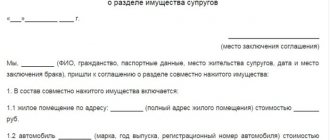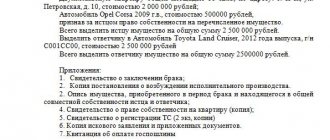The law provides the right to division of jointly acquired property of spouses in marriage - movable and immovable. This procedure involves the allocation of equal shares of property to the parties, regardless of the expenditure of whose funds it was acquired. So, for example, if one of the spouses was not officially employed, that is, did not have a source of income due to certain circumstances, he also has the right to claim for half the property. These circumstances include raising children, illness, and housekeeping. However, not all acquired property is subject to division.
Property of a personal nature (defined in Article 36 of the Family Code), as well as that which is subject to the right of personal property (Article 42 of the Family Code), cannot be divided a priori.
Disputes about division often involve certain difficulties. Spouses do not always give an objective assessment, according to which the real value of the property is determined. It is also possible that the price may be deliberately concealed. In view of this, the court has the right to request additional information about the amount and value of the spouses’ property in order to make a fair decision.
Main regimes of marital property
According to the articles of the RF IC, there are currently two main regimes in force in the country, according to which spouses are endowed with the rights to own property. The division of property acquired during the marriage can occur only after the determination of the regime, which has been agreed upon and, if necessary, documented by the spouses.
The division of the property of spouses, which was subject to the legal regime, is a simplified procedure, which is due to the absence of the need to determine whether each spouse has the right to own a particular thing.
However, the treaty regime still has priority. According to its norms, spouses can stipulate in advance what kind of joint property will go to each of them, both after a divorce and independently of it. The agreement may apply to both property already acquired by the spouses and to property that is just planned to be acquired.
Video
Agreement on division of marital property
Drawing up a notarial agreement between a husband and wife greatly simplifies the process of dividing property. It helps determine the shares of the wife and husband in jointly acquired property on mutually beneficial terms
Is it necessary to have an agreement on the division of property between spouses certified by a notary?
The answer to this question is contained in paragraph 2 of Art. 38 of the RF IC - “...an agreement on the division of common property acquired by spouses during marriage must be notarized,” which indicates mandatory notarization of the agreement.
It is important that if you draw up an agreement without notarization, then for the court it is void.
Moreover, in such a document all issues related to property must be resolved, otherwise the notary will not certify this document and this process will be considered in court.
How to draw up an agreement on the division of property?
In order to draw up an agreement and have it certified by a notary, the two parties to the process need to agree among themselves about what each other will get and in what proportion. Remember, there should be no disagreements in the agreement!
After you have decided on the property, visit the notary with the following package of documents:
- passport of husband and wife;
- documents confirming ownership: purchase and sale agreements;
- certificates of registration of ownership;
- all possible sales and cash receipts;
- PTS (if we are talking about a car) and other documents.
The cost of notary services for concluding a voluntary agreement on the division of property is 0.5% of the valued property + 5,000 rubles. with the right to transfer ownership or 10,000 rubles. without the right to transfer ownership.
For example, if spouses divide by agreement property valued at 2,400,000 (apartment), they will pay the notary the following price for the agreement:
- 2,400,000 x 0.5% + 5000 = 17,000 rub. — with the right to transfer ownership;
- 2,400,000 x 0.5% + 10,000 = 22,000 rub. - without the right to transfer ownership.
There is no need to prepare the agreement document yourself; its cost will not change: it is drawn up personally by a notary on a special form; the spouses are only required to voice their will regarding the subsequent ownership of the property.
Sample agreement on division of marital property 2021
Regulatory and legal regime
According to average statistical data, the legal or regulatory regime is currently the most common form. It does not require the conclusion of additional contracts, agreements, or documentary evidence, which explains the simplicity of this option.
As Article 33 of the RF IC states, the legal regime arises directly during the period when the procedure for concluding a marriage between the parties is carried out. According to this form of regime, each spouse is given the legal right to own an equal share of the things that were acquired during the marriage with the other party.
In the event that there is nothing otherwise, and the property of the parties is subject to legal regime, the court allows the distribution of property between the spouses in identical shares. That is, priority is not given to any things that need to be transferred to one of the parties, and also to replace them with a similar option for the second. The division is made based on the value and need of the property.
Treaty-based regime
According to Article 8 of the RF IC, the contractual regime is defined as the drawing up of an agreement, either a marriage contract before or during the marriage. In accordance with the specified document, the spouses stipulate all aspects that relate to the existing property. An agreement has legal force only in cases where it is drawn up in the form of a written agreement and certified in accordance with the requirements of regulatory legal acts.
Contrary to popular belief, this agreement is not a fundamental document in the procedure for dividing property in court proceedings. Depending on additional circumstances and nuances of the case, some deviation from its points is allowed if, for example, they are deliberately drawn up in such a way that after marriage one of the spouses loses the right to own the necessary types of property.
In general, this type of agreement has some clear advantages, for example:
- Spouses have the right to dispose of existing property as they see fit. However, if during the division there is a clear infringement of one of the parties, for example, if he loses the right to own almost all acquired property, the court has the right to distribute the property between the spouses in equal shares.
- The agreement also provides spouses with the advantage of knowing the distribution of all property upon divorce. Thus, the parties have the right to independently determine what of the joint property is of primary importance to them, which does not contradict the articles of the RF IC.
Drawing up a contract is not a prerequisite. Spouses have the right to enter into a contract if they consider this procedure necessary.
The concept of joint property
The concept includes all types of property, including real estate, securities, assets, accounts, jewelry that were acquired by spouses with financial savings during marriage (Article 34 of the RF IC). Only those that are of a personal nature or were acquired by one of the parties before the marriage are excluded from this list.
Not only property is common, but also debt obligations (Article 34 of the RF IC). Thus, debt on loans taken from both state and commercial banks can be divided by the court between spouses in equal shares.
In general, joint property is determined by the following criteria:
- If, during the marriage, spouses acquire property of an immovable nature, for example, a plot of land, a house or an apartment, this property is subject to division regardless of who is the legal owner. Thus, in the process of dividing property, each party is given the right to claim half of the above joint property (Article 34 of the RF IC).
- This kind of rule applies not only to real estate, but also to movable property of spouses. So, if the parties purchase various things, for example, furniture, a car, equipment, and one of the spouses is indicated as the owner, the second can also lay claim to this property.
- There is also the concept of joint income, according to which the property of the spouses is acquired. Among these financial resources are those that are the main and additional types of income of the spouses. However, there are some exceptions. So, for example, funds that were received by either party for personal merit, as compensation for harm or damage, as well as maternity capital are not considered joint.
Thus, only the division of property that was acquired by spouses not only during marriage, but also through the expenditure of joint income is permissible.
Video
Criteria for personal and joint ownership
Despite the fact that, according to the articles of the RF IC, the personal property of the parties is not subject to division, it is possible to give personal property the status of joint property. This option is only possible through the issuance of an appropriate court decision. In this case, one of the parties may act as an initiator.
In order for the court to make a positive decision, the plaintiff must provide irrefutable arguments about the need to transfer personal property into joint property.
The main aspects of this type of procedure are the following:
- According to Article 37 of the RF IC, property can be transferred to joint ownership if, during the marriage, the spouse who is not the direct owner invested a significant amount of financial resources in improving the property, for example, renovating an apartment. To confirm the existence of material costs, documentary evidence is required.
- To find out exactly how much money was invested in the property, it is permissible to conduct an examination as part of the legal process. The expert is asked the following question: the average price, for example, of an apartment, before investing financial resources, and after (Article 37 of the RF IC).
If the spouses have reached an agreement, it is permissible to transfer personal property into joint property through the conclusion of transactions (Article 37 of the RF IC).
Nuances and features
There are clarifications to the courts of the Supreme Court of the Russian Federation regarding the application of Art. 38 of the RF IC, which interpret some of the nuances of the meaning of the article. For example, the question arises of determining the price of each piece of property if it is necessary to distribute it between husband and wife. According to the explanations, the value of the property is determined based on the price level at the time of consideration of the disputes.
The courts should also take into account the fact of the existence of a marriage contract. It is this document that can change the division procedure established by the legislator.
It is in such cases that the property will be divided according to the contract. By law, spouses can draw it up both before marriage and after its dissolution. In addition, it is important to consider other provisions:
- any property that the husband and wife have at the time of the dispute is considered in the division procedure;
- Not only property assets are divided, but also the debts of the spouses, as well as their obligations that arose in the interests of the family.
In addition to this article, judges must comprehensively take into account the provisions of the RF IC in the field of determining the property that is not subject to division.
Thus, Article 38 of the IC of Russia defines the main rules on the division of joint property of a husband and wife. Knowing it is relevant for everyone who is married and plans to enter into a legal marriage.
Division of property acquired during marriage
Article 38 of the RF IC states that the property of spouses can be divided not only after the actual divorce of the marriage, but also during the specified period. This procedure, as well as division after divorce, is governed by similar rules and regulations. There are two main options for dividing property. The most common is going to court. If, after a certain period, the spouses undergo divorce proceedings, the joint property will be divided according to the existing decision.
The process of division of property can be carried out during the marriage, regardless of the time of its actual duration.
Spouses can also divide property in accordance with the settlement agreement. In this case, even if the property is subsequently divided in court, the court will rely on the clauses reflected in the agreement.
Case N2090-O.
Laws and codes » Family Code of the Russian Federation » Section III. Rights and obligations of spouses » Chapter 7. Legal regime of property of spouses » Article 38. Division of common property of spouses » Case N2090-O. CONSTITUTIONAL COURT OF THE RUSSIAN FEDERATION
DEFINITION
dated September 29, 2021 N 2090-O
ABOUT REFUSAL TO ACCEPT A CITIZEN'S COMPLAINT FOR CONSIDERATION
SALIKOVA LIDIA ISHKUZOVNA FOR VIOLATION OF HER CONSTITUTIONAL
RIGHTS UNDER PARAGRAPH 7 OF ARTICLE 38 OF THE FAMILY CODE
RUSSIAN FEDERATION
The Constitutional Court of the Russian Federation, composed of Chairman V.D. Zorkin, judges K.V. Aranovsky, A.I. Boytsova, N.S. Bondar, G.A. Gadzhieva, Yu.M. Danilova, L.M. Zharkova, S.M. Kazantseva, S.D. Knyazeva, A.N. Kokotova, L.O. Krasavchikova, S.P. Mavrina, N.V. Melnikova, Yu.D. Rudkina, O.S. Khokhryakova, V.G. Yaroslavtseva,
having considered the possibility of accepting the complaint of citizen L.I. Salikova for consideration at a meeting of the Constitutional Court of the Russian Federation,
installed:
1. By the decision of a court of general jurisdiction to satisfy the claims of citizen L.I. Salikova's request for the separation of the marital share from the inheritance mass and the recognition of her right of ownership of real estate was refused and the counterclaims were satisfied - for the recognition of the disputed property as the common joint property of the spouses, the allocation of the spousal share in it and for the recognition of the right of ownership by inheritance for citizen A The appeal ruling is this decision regarding the refusal to satisfy the claims of L.I. Salikova was left unchanged. At the same time, the courts proceeded from the fact that L.I. Salikova went to court for missing the statute of limitations, but she did not provide evidence that the omission was valid.
In his complaint to the Constitutional Court of the Russian Federation, L.I. Salikova challenges the constitutionality of paragraph 7 of Article 38 of the Family Code of the Russian Federation, according to which a three-year statute of limitations applies to the claims of spouses for the division of common property of spouses whose marriage is dissolved.
According to the applicant, the contested norm contradicts Articles 15 (parts 1, 2 and 4), 17 (part 1), 18, 19 (part 2), 35 (parts 1 and 2), 40 (part 1), 46 (part 1 ) and 55 (parts 1 - 3) of the Constitution of the Russian Federation, since it allows for arbitrary calculation of the limitation period in cases of division of common property of spouses and its discriminatory application.
2. The Constitutional Court of the Russian Federation, having studied the presented materials, finds no grounds for accepting this complaint for consideration.
The Constitutional Court of the Russian Federation has repeatedly indicated that the regulation of deadlines for applying to court, including their change and cancellation, falls within the competence of the legislator and that the establishment of these deadlines is due to the need to ensure the stability of legal relations and cannot be regarded as a violation of the right to judicial protection (rulings of December 14 1999 N 220-О, dated November 15, 2007 N 796-О-О, dated November 17, 2011 N 1495-О-О, dated December 24, 2012 N 2407-О, etc.). This conclusion fully applies to the civil law institution of limitation of actions (definitions dated June 24, 2008 N 364-О-О, dated February 19, 2009 N 96-О-О, dated September 23, 2010 N 1154-О- O, etc.), in particular, on the determination by the legislator of the moment of the beginning of the specified period (definitions of November 20, 2008 N 823-О-О, of February 16, 2012 N 313-О-О, etc.).
Thus, the position of paragraph 7 of Article 38 of the Family Code of the Russian Federation is in the system of norms governing the application of the limitation period, including in conjunction with paragraph 2 of Article 9 of the same Code and paragraph 1 of Article 200 of the Civil Code of the Russian Federation, taking into account the explanation contained in paragraph 19 of the Resolution of the Plenum of the Supreme Court of the Russian Federation dated November 5, 1998 N 15 “On the application of legislation by courts when considering cases of divorce”, according to which the statute of limitations for the requirements named in paragraph 7 of Article 38 of the Family Code of the Russian Federation is not calculated from the moment divorce, and from the day when the person learned or should have learned about the violation of his right - cannot be considered as violating the constitutional rights of citizens (rulings of the Constitutional Court of the Russian Federation dated October 21, 2008 N 651-О-О, dated December 24, 2012 year N 2407-O, dated December 23, 2014 N 2907-O and dated May 21, 2015 N 1199-O).
Determination of the specific moment from which the courts should have calculated the limitation period according to the stated L.I. Salikova’s requirement does not fall within the competence of the Constitutional Court of the Russian Federation, as defined in Article 125 of the Constitution of the Russian Federation and Article 3 of the Federal Constitutional Law “On the Constitutional Court of the Russian Federation”.
Based on the above and guided by paragraph 2 of Article 43, part one of Article 79, Articles 96 and 97 of the Federal Constitutional Law “On the Constitutional Court of the Russian Federation”, the Constitutional Court of the Russian Federation
defined:
1. Refuse to accept for consideration the complaint of citizen Lidiya Ishkuzovna Salikova, since it does not meet the requirements of the Federal Constitutional Law “On the Constitutional Court of the Russian Federation,” according to which the complaint to the Constitutional Court of the Russian Federation is considered admissible.
2. The ruling of the Constitutional Court of the Russian Federation on this complaint is final and not subject to appeal.
Chairman
Constitutional Court
Russian Federation
V.D.ZORKIN
Division of property during divorce
According to the articles of the RF IC, each spouse is entitled to own property in equal shares with the other party. However, such a division in practice is not always possible, since not all joint property is divisible.
To avoid such troubles, spouses are recommended to enter into a marriage contract or agreement, according to which each party has a certain share of joint property. In this case, during the trial, the clauses of such an agreement will be considered as a priority.
In general, the division of joint property implies compliance with certain rules:
- If, when dividing joint property, the rights of one of the spouses are significantly infringed, the court has the right to deviate from accepted norms and divide the property in such a way as to exclude such a result.
- Even after filing a claim for division of joint property, spouses are given the right to terminate the case in connection with reconciliation. This is only possible in cases where a peace agreement is made on a voluntary basis.
A separate aspect in the issue of division of joint property is civil marriage. Due to the fact that relations of this kind are not legally significant, they are regulated by articles of the Civil Code of the Russian Federation, according to which joint ownership in such cases is shared. Division in this case can also occur either by going to court or by concluding a contract or agreement. Moreover, the second option is the most optimal.
One of the most important aspects observed by the court prevents the rights of one of the parties from being infringed even if the joint property is actually divided in equal shares. Each of the spouses after a divorce must be provided for both materially and in property terms, but priority in such cases is given to the spouse with whom the children will live after the completion of the divorce process.
Recommended publications:
Popular questions and answers about the division of an apartment acquired together during marriage:
- Division of jointly acquired real estate of spouses (apartment acquired during marriage and before marriage)
- Division of jointly acquired property of spouses and cohabitants, division of loan debts
We recommend the following publications on the division of common debts of spouses (under credit obligations):
- Comments on Article 39 of the Family Code of the Russian Federation
- other publications in the section Division of property of spouses, divorce, marriage contract (samples of statements of claim, agreements on the division of common property of spouses, samples of marriage contract)
- Statement of claim for division of marital property
Agreement on the division of common property of spouses
- Sample agreement on the division of common property of spouses
- Sample (example) of an agreement on the division of property of spouses
- Statement of claim (counter) to invalidate the agreement on the division of marital property and the allocation of a share










